(考点特训)2025年中考英语一轮复习10:Grade 8 Book 1 Modules 10~12课件(外研版八年级上册)
文档属性
| 名称 | (考点特训)2025年中考英语一轮复习10:Grade 8 Book 1 Modules 10~12课件(外研版八年级上册) |  | |
| 格式 | pptx | ||
| 文件大小 | 484.1KB | ||
| 资源类型 | 试卷 | ||
| 版本资源 | 外研版 | ||
| 科目 | 英语 | ||
| 更新时间 | 2025-05-12 23:38:23 | ||
图片预览



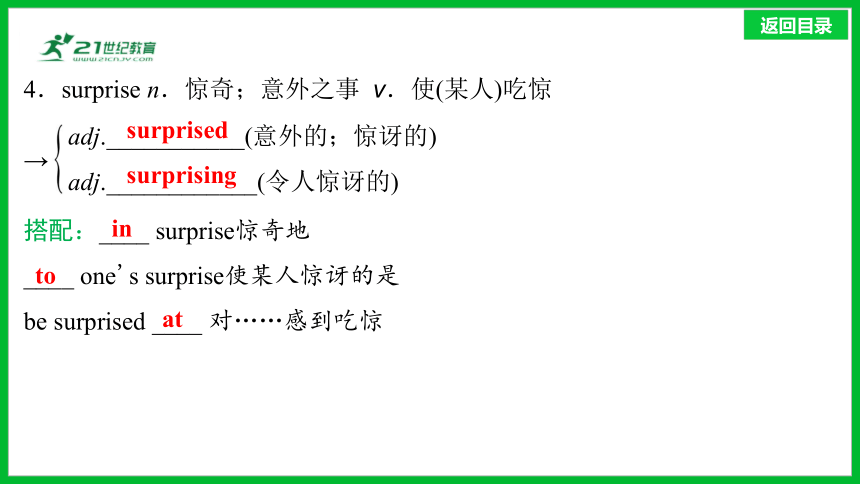
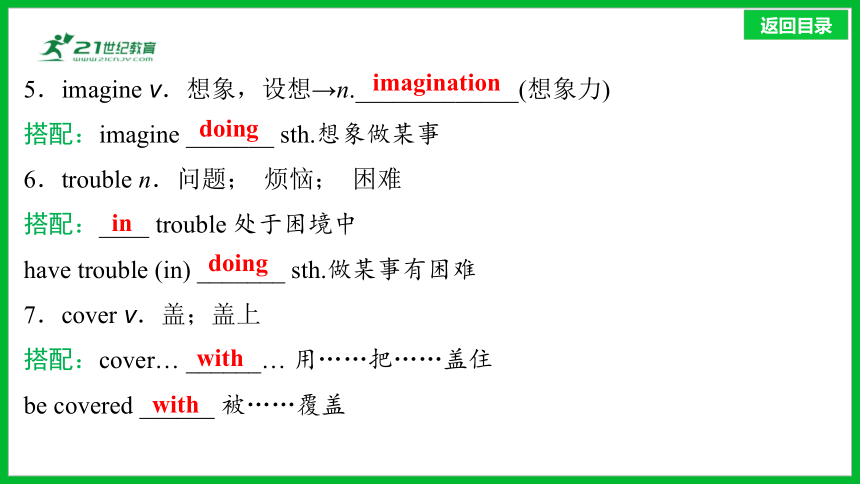
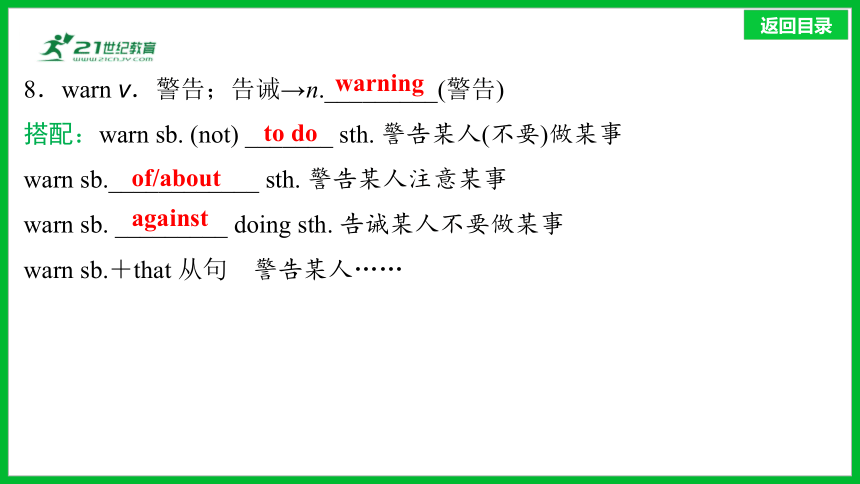

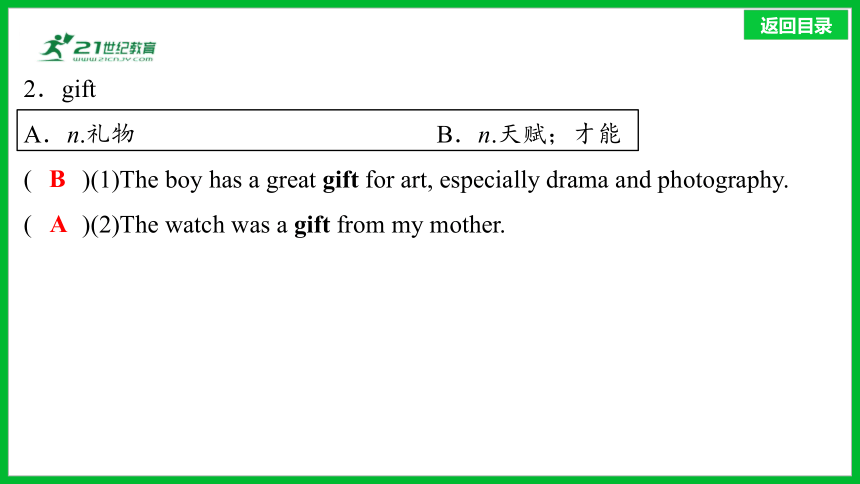

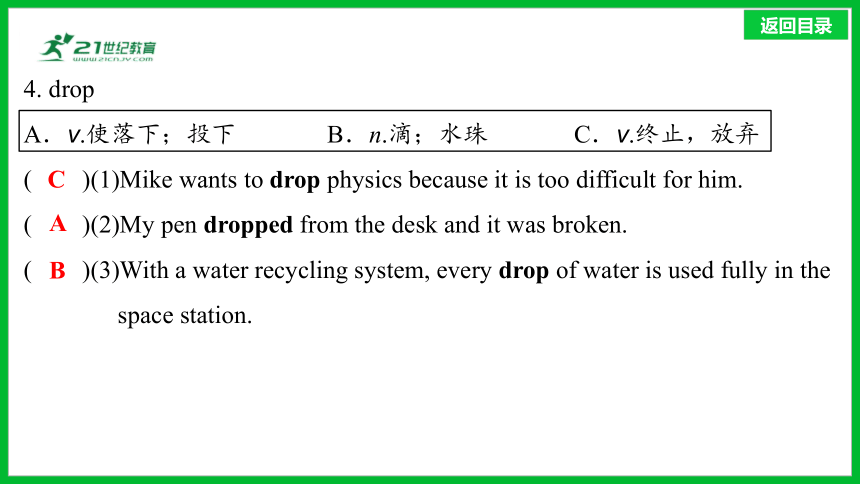
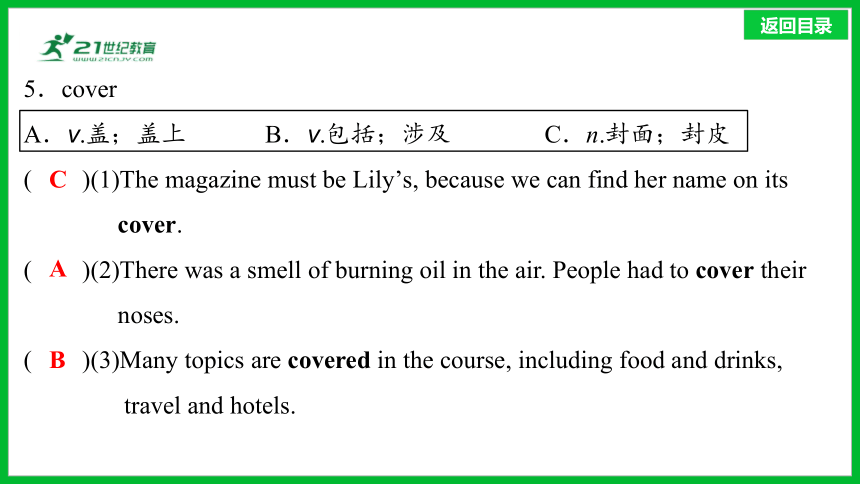
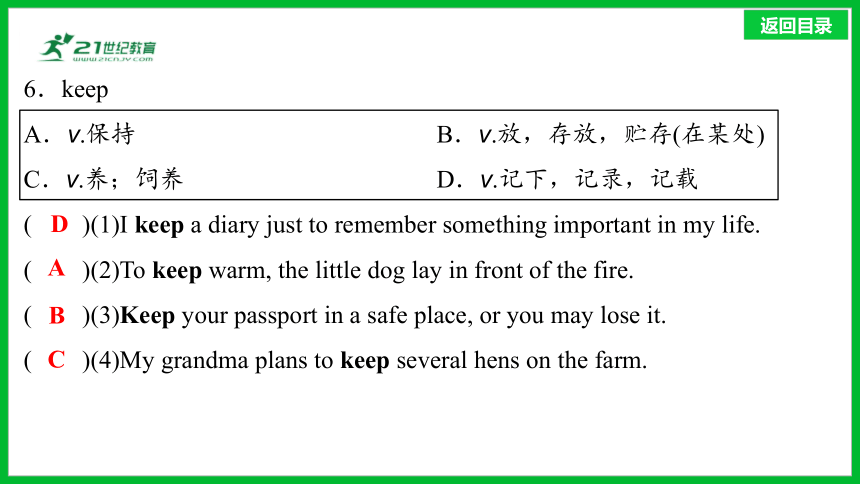
文档简介
(共50张PPT)
中考一轮复习 教材知识整合
Grade 8 Book 1
Modules 10~12
高频词汇·聚中考
重难考点·提能力
语法整合·增效能
核心实验·提素养
文化热点·通古今
高频词汇·聚中考
1.skate v.滑冰→n._________(滑冰)
搭配:____ skating 去滑冰
2.joke v.说笑话;开玩笑 n.笑话;玩笑
搭配:play jokes/a joke ____ sb.戏弄某人;对某人恶作剧;开某人的玩笑
3.temperature n.温度
搭配:______ one's temperature量某人的体温
skating
go
on
take
4.surprise n.惊奇;意外之事 v.使(某人)吃惊
→
搭配:____ surprise惊奇地
____ one's surprise使某人惊讶的是
be surprised ____ 对……感到吃惊
adj.___________(意外的;惊讶的)
adj.____________(令人惊讶的)
surprised
surprising
in
to
at
5.imagine v.想象,设想→n._____________(想象力)
搭配:imagine _______ sth.想象做某事
6.trouble n.问题; 烦恼; 困难
搭配:____ trouble 处于困境中
have trouble (in) _______ sth.做某事有困难
7.cover v.盖;盖上
搭配:cover… ______… 用……把……盖住
be covered ______ 被……覆盖
imagination
doing
in
doing
with
with
8.warn v.警告;告诫→n._________(警告)
搭配:warn sb. (not) _______ sth. 警告某人(不要)做某事
warn sb.____________ sth. 警告某人注意某事
warn sb. _________ doing sth. 告诫某人不要做某事
warn sb.+that 从句 警告某人……
warning
to do
of/about
against
1.shower
A.n.阵雨 B.n.淋浴
( )(1)Susan walked out of the bathroom. She had just had a shower.
( )(2)I was all wet because of the thunder shower, which made me feel uncomfortable.
熟词生义
B
A
2.gift
A.n.礼物 B.n.天赋;才能
( )(1)The boy has a great gift for art, especially drama and photography.
( )(2)The watch was a gift from my mother.
B
A
3.taste
A.v.有……的味道;品尝 B.n.味道;滋味 C.n.鉴赏力;品味
( )(1)I don't like the taste of onions, so I seldom cook with them.
( )(2)Maria is thought to have good taste in music. The songs she chooses
to listen to are pleasant.
( )(3)The local food becomes so popular that people all over China travel
there to taste it.
B
C
A
4. drop
A.v.使落下;投下 B.n.滴;水珠 C.v.终止,放弃
( )(1)Mike wants to drop physics because it is too difficult for him.
( )(2)My pen dropped from the desk and it was broken.
( )(3)With a water recycling system, every drop of water is used fully in the
space station.
C
A
B
5.cover
A.v.盖;盖上 B.v.包括;涉及 C.n.封面;封皮
( )(1)The magazine must be Lily’s, because we can find her name on its
cover.
( )(2)There was a smell of burning oil in the air. People had to cover their
noses.
( )(3)Many topics are covered in the course, including food and drinks,
travel and hotels.
C
A
B
6.keep
A.v.保持 B.v.放,存放,贮存(在某处)
C.v.养;饲养 D.v.记下,记录,记载
( )(1)I keep a diary just to remember something important in my life.
( )(2)To keep warm, the little dog lay in front of the fire.
( )(3)Keep your passport in a safe place, or you may lose it.
( )(4)My grandma plans to keep several hens on the farm.
D
A
B
C
词汇攻关
单项填空
1.To their ________, the head teacher attended the discussion and gave them some advice.
A.shame B.pity
C.surprise D.regret
C
2.-I have ________ in learning English and I'm worried. Could you help me with it
-Sure, I'd love to.
A.joy B.interest
C.kindness D.trouble
3.In northern parts of China, the ________ in winter is always below zero, so people could enjoy beautiful snowy days.
A.event B.temperature
C.scene D.holiday
D
B
4.The cartoons made by the artist sell well,but several years ago,no one could ________ what a great role he would play in this field.
A.imagine B.support
C.develop D.expect
5.Please ________ the sofa with something, or it will get dirty.
A.use B.cut
C.cover D.wash
A
C
单词拼写
6.Stop here, Mike! It's crazy of you to s______(滑冰) on such thin ice.
7.The signs in the museum w_____(告诫) us not to touch those works of art.
8.Mr. Miller’s j_____(笑话) was so funny that all the people at the meeting couldn’t stop laughing.
kate
arn
oke
重难考点·提能力
考点1
keep的用法
【教材例句】Keep calm, especially when you are with other people.保持镇定,尤其是当你和他人在一起时。 【八(上)Module 12 P98】
e.g. Shirley often talks to her husband to keep him awake when he drives at night.雪莉经常在她丈夫夜间开车时和他说话,让他保持清醒。
Our nails help keep our fingers from getting hurt. 我们的指甲有助于防止我们的手指受伤。
Every time I want to give up, my parents encourage me to keep trying.每次我想放弃的时候,我的父母鼓励我继续尝试。
考点2
辨析wish、hope、expect与look forward to
【教材例句】I wish I were in Australia now. 我希望我此刻在澳大利亚。
【八(上)Module 10 P80】
考 点 含义及用法 搭 配
wish 意为“希望”,后接从句时,从句常用虚拟语气,侧重于不太可能实现的愿望 (1)wish sb. sth.祝愿某人……
(2)wish (sb.) to do sth.希望(某人)做某事
(3)wish+that从句 希望……
考 点 含义及用法 搭 配
hope 意为“希望”,多用于表达一种情感 (1)hope to do sth.希望做某事
(2)hope for sth.希望得到某物
(3)I hope so/not.我希望如此/我不希望这样。
expect 意为“预料,期待,认为某事会发生” (1)expect (sb.) to do sth.期望(某人)做某事
(2)be expected to do sth.被期望做某事
(3)expect sb./sth.期待某人/某物
(4)expect +that从句 期望……
look forward to 意为“盼望,期待”,常用于表示期望或向往某物或做某事 look forward to sth./doing sth.期待某物/做
某事
e.g. Tom misses his family and wishes to have his grandma’s dumplings. 汤姆想念他的家人,希望能吃到他奶奶包的饺子。
I hope to have a good time in my dreaming senior high school! 我希望我能在梦想的高中度过一段美好的时光!
They always expect to see more Monkey King cartoons. 他们总是期望看到更多的美猴王动画片。 【八(下) Module 5 P36 】
In the coming days, I look forward to spending more time with my family. 在接下来的日子里,我期待花更多的时间和家人在一起。
考点3
询问天气的常用句型
【教材例句】What’s the weather like in America in winter, Betty 贝蒂,美国冬季的天气怎么样?【八(上)Module 10 P80】
(1)询问天气状况的两种常用句型:
How’s the weather…?
What’s the weather like…?
(2)答语常为:It’s+表示天气的形容词。常见的表示天气的形容词有:
注意:根据不同的时态,be动词采用不同的形式;weather是不可数名词,不能用a或an修饰。
e.g. -What’s the weather like/How’s the weather in Hefei now 合肥现在的天气怎么样?
-It’s rainy. 下雨。
活学巧练
单项填空
1.The final exam is coming and I ________ all of us to get good grades in the exam.
A.believe B.expect
C.suggest D.support
B
2.Controlling the moods can keep us ________ doing something we will regret later on.
A.with B.for
C.from D.into
3.-Could you tell me ________ the weather will be like tomorrow
-It will be sunny.
A.what B.how
C.why D.when
C
A
4.-What’s the weather like in summer in your home town, Jack
-________. So we often go outside with an umbrella.
A.It’s warm B.It’s rainy
C.It’s windy D.It’s cold
B
单词拼写
5.If you k_____(持续) practising every day, you will finally be successful one day.
6.I w____(希望) that I could fly to the moon to explore mysteries sometime in the future.
eep
ish
语法整合·增效能
情态动词
考点1
情态动词的基本用法
情态动词 用 法 例 句
can 表请求、允许和能力 (1)表示一般性的能力 (2)表示“请求、允许”,多用于口语中 (3)表示“允许(做某 事)”,与may的含义相近,在日常口语中常用can Who can answer this question?谁能回答这个问题?
Can we bring music players to school?我们可以带音乐播放器到学校吗?
You can phone me after five this afternoon.今天下午五点后你可以给我打电话。
情态动词 用 法 例 句
could 表请求和能力 (1)表示过去的“能力” (2)表示委婉的请求 Mary could read by herself at the age of four.玛丽四岁时就能自己读书了。
Could you please help me with my English 你能帮我学英语吗?
may 表请求和允许 (1)用来征求对方的意见 (2)用于陈述句,表示同意别人做某事 May I borrow your pen?我可以借一下你的钢笔吗?
You may come if you wish.如果你想来,你就来。
情态动词 用 法 例 句
might 表请求、许可 语气比may更加委婉 Might I park my car here?我可以把车停这儿吗?
must 表命令、建议 表示“必须;一定要”,多指现在或将来的情况,指说话人的主观语气,其否定形式表示“禁止” We must be careful when we are walking across the road.当我们过马路的时候我们必须要小心。
情态动词 用 法 例 句
have to 表必要性 表示不得不,多指客观上的必要性 I have to be off now. My mom is waiting for me.我现在得走了。我妈妈在等我。
should 表要求、劝告 表示义务、职责等,往往表示说话者的观点,意为“应该” We should protect the environment.我们应该保护环境。
You shouldn’t drive the car after drinking alcohol.你不应该酒后驾车。
情态动词 用 法 例 句
will 表示意愿和请求 (1)自愿做或主动提出做什么,如意志、愿望或决心等 (2)与you连用表示请求或要求;would比will更客气、委婉 I won’t argue with you.我不愿意和你争辩。
Will you eat dinner with me tomorrow, Tom?汤姆,你明天愿意和我一起吃晚饭吗?
Would you please do me a favour 你愿意帮我一个忙吗?
情态动词 用 法 例 句
had better 表示 “最好” 用来表示劝告或建议,后接动词原形,其否定形式为had better not You’d better eat these bananas before they go bad.你最好在这些香蕉坏掉之前把它们吃掉。
You had better not miss the last bus.你最好不要错过末班公共汽车。
情态动词 用 法 例 句
need 表示必要性和需要 (1)在表否定的句子中,表示“不必”,还可以说don't have to (2)在疑问句和肯定句中,表示需要 You needn’t come if you are busy.如果你忙,你就不必来了。
-Need I come tomorrow?我明天需要来吗?
-No, you needn’t/don’t have to./Yes, you must/have to.不,你不必来。/是的,你必须来。
情态动词 用 法 例 句
shall (1)表示请求或征求对方意见 (2)表示许诺、命令等语气 (1)常用于主语是第一人称的疑问句 (2)多用于第二或第三人称 Shall we get each of them a card and gift to say thank you 我们给他们每人送张卡片和一份礼物表示感谢好吗?
He shall have the book when I finish reading.当我读完这本书后,他可以拿到这本书。
考点2
情态动词表推测
情态动词 用 法 例 句
can 表示推测,往往用于否定句或疑问句中 That can’t be Jane. She’s in hospital.那不可能是简。她在住院。
could 既可以表示过去的可能性,也可以表示现在的可能性,比can的可能性要弱 You could be right, I think.我想你可能是对的。
情态动词 用 法 例 句
may may表示的可能性比could小 Amy may know my phone number.埃米可能知道我的电话号码。
might 可以表示过去的可能性,也可以表示现在的可能性,表示现在的可能性时比may表示的可能性小 He told me he might be late.他告诉我他可能会晚到。
must 常译为“一定是;准是”,常指有根据的、比较有把握的推测。这种用法只能用于肯定句 Jack and Dick must be twins. They look so much alike.杰克和迪克肯定是双胞胎。他们长得太像了。
单项填空
1.Although Mike is only five years old, he ________ dress himself every morning.
A.should B.may
C.can D.might
语法闯关
C
2.We ________ know something about the Youth Protection Law so that we can protect ourselves.
A.can B.would
C.may D.should
3.-Look at the boy running on the playground. Is that David
-It ________ be him. I saw him go to the teachers’ office just now.
A.mustn’t B.shouldn’t
C.can’t D.needn’t
D
C
4.According to the traffic rules, people ________ ride e bikes without wearing helmets.
A.mustn’t B.needn’t
C.may not D.might not
5.-This computer ________ be Li Ming’s.
-Yes. His name is on the back of it.
A.need B.may
C.must D.can
A
C
6.-Mom, may I go to the party with my classmate tonight
-Yes, honey. But I’m afraid you ________ be back before 10 o’clock. You
mustn’t stay outside too late.
A.can B.may
C.have to D.will
7.-Everything is ready for the party.
-Do you mean I ________ bring anything with me
A.can’t B.couldn’t
C.mustn’t D.needn’t
C
D
8.It is going to rain. You’d better ________ the window open when you go out.
A.not leave B.not to leave
C.won’t leave D.no leaving
A
文化热点·通古今
① short online video caught people’s attention: a student brought a piece of meat for his teacher to say thanks for her care and education. That sounds a little funny, right Actually, it was a tradition to give teachers dried salted meat as a gift in ancient China, which was called shu xiu, or “束脩” in Chinese.
A
话题:束脩之礼 体裁:说明文 词数:约240 难度:★★★ 建议用时:6分钟 实际用时: 正确率:
②In ancient times, people didn’t eat meat very often because it was expensive. It was so valuable that people could even use it to buy things. So giving teachers dried salted meat when children started school showed that the ancient Chinese respected teachers and valued education highly.
The practice of shu xiu started over 2,000 years ago. And it lasted for many centuries until the Tang Dynasty. Over time, shu xiu took on different forms, and the meaning of the expression changed as well. Some people used it to refer to the money students paid for their education at school and even called a teacher’s salary shu xiu.
In modern times, teachers in China are still highly respected and valued, but the ways of showing thanks have changed. Giving teachers dried salted meat as a gift is not common any more.
Nowadays, students often give gifts such as flowers and cards to their teachers. However, the tradition of shu xiu remains an important part of Chinese history and culture, reminding us of the importance of education and the tradition of respecting teachers.
精准检测
1.What did the student bring to his teacher in the short video?( )
精准检测
A B C D
C
2.Why did ancient Chinese use dried salted meat to show their respect for teachers?( )
A.Because it was healthy.
B.Because it was popular.
C.Because it was delicious.
D.Because it was valuable.
D
3.What is Paragraph 3 mainly about?( )
A.Who practised shu xiu.
B.The history of shu xiu.
C.How shu xiu was started.
D.The importance of shu xiu.
B
4.What’s the purpose of the text?( )
A.To explain an ancient tradition.
B.To show the writer’s respect for teachers.
C.To describe the value of education.
D.To remind people of an ancient expression.
A
积累卡
短语:catch one’s attention 引起某人的注意 as well 也,同样地
pay for 支付 such as 例如 remind…of… 提醒……;使想起……
句式:It was so valuable that people could even use it to buy things.它如此贵重,以至于人们甚至可以用它买东西。【适用话题:事物介绍】
中考一轮复习 教材知识整合
Grade 8 Book 1
Modules 10~12
高频词汇·聚中考
重难考点·提能力
语法整合·增效能
核心实验·提素养
文化热点·通古今
高频词汇·聚中考
1.skate v.滑冰→n._________(滑冰)
搭配:____ skating 去滑冰
2.joke v.说笑话;开玩笑 n.笑话;玩笑
搭配:play jokes/a joke ____ sb.戏弄某人;对某人恶作剧;开某人的玩笑
3.temperature n.温度
搭配:______ one's temperature量某人的体温
skating
go
on
take
4.surprise n.惊奇;意外之事 v.使(某人)吃惊
→
搭配:____ surprise惊奇地
____ one's surprise使某人惊讶的是
be surprised ____ 对……感到吃惊
adj.___________(意外的;惊讶的)
adj.____________(令人惊讶的)
surprised
surprising
in
to
at
5.imagine v.想象,设想→n._____________(想象力)
搭配:imagine _______ sth.想象做某事
6.trouble n.问题; 烦恼; 困难
搭配:____ trouble 处于困境中
have trouble (in) _______ sth.做某事有困难
7.cover v.盖;盖上
搭配:cover… ______… 用……把……盖住
be covered ______ 被……覆盖
imagination
doing
in
doing
with
with
8.warn v.警告;告诫→n._________(警告)
搭配:warn sb. (not) _______ sth. 警告某人(不要)做某事
warn sb.____________ sth. 警告某人注意某事
warn sb. _________ doing sth. 告诫某人不要做某事
warn sb.+that 从句 警告某人……
warning
to do
of/about
against
1.shower
A.n.阵雨 B.n.淋浴
( )(1)Susan walked out of the bathroom. She had just had a shower.
( )(2)I was all wet because of the thunder shower, which made me feel uncomfortable.
熟词生义
B
A
2.gift
A.n.礼物 B.n.天赋;才能
( )(1)The boy has a great gift for art, especially drama and photography.
( )(2)The watch was a gift from my mother.
B
A
3.taste
A.v.有……的味道;品尝 B.n.味道;滋味 C.n.鉴赏力;品味
( )(1)I don't like the taste of onions, so I seldom cook with them.
( )(2)Maria is thought to have good taste in music. The songs she chooses
to listen to are pleasant.
( )(3)The local food becomes so popular that people all over China travel
there to taste it.
B
C
A
4. drop
A.v.使落下;投下 B.n.滴;水珠 C.v.终止,放弃
( )(1)Mike wants to drop physics because it is too difficult for him.
( )(2)My pen dropped from the desk and it was broken.
( )(3)With a water recycling system, every drop of water is used fully in the
space station.
C
A
B
5.cover
A.v.盖;盖上 B.v.包括;涉及 C.n.封面;封皮
( )(1)The magazine must be Lily’s, because we can find her name on its
cover.
( )(2)There was a smell of burning oil in the air. People had to cover their
noses.
( )(3)Many topics are covered in the course, including food and drinks,
travel and hotels.
C
A
B
6.keep
A.v.保持 B.v.放,存放,贮存(在某处)
C.v.养;饲养 D.v.记下,记录,记载
( )(1)I keep a diary just to remember something important in my life.
( )(2)To keep warm, the little dog lay in front of the fire.
( )(3)Keep your passport in a safe place, or you may lose it.
( )(4)My grandma plans to keep several hens on the farm.
D
A
B
C
词汇攻关
单项填空
1.To their ________, the head teacher attended the discussion and gave them some advice.
A.shame B.pity
C.surprise D.regret
C
2.-I have ________ in learning English and I'm worried. Could you help me with it
-Sure, I'd love to.
A.joy B.interest
C.kindness D.trouble
3.In northern parts of China, the ________ in winter is always below zero, so people could enjoy beautiful snowy days.
A.event B.temperature
C.scene D.holiday
D
B
4.The cartoons made by the artist sell well,but several years ago,no one could ________ what a great role he would play in this field.
A.imagine B.support
C.develop D.expect
5.Please ________ the sofa with something, or it will get dirty.
A.use B.cut
C.cover D.wash
A
C
单词拼写
6.Stop here, Mike! It's crazy of you to s______(滑冰) on such thin ice.
7.The signs in the museum w_____(告诫) us not to touch those works of art.
8.Mr. Miller’s j_____(笑话) was so funny that all the people at the meeting couldn’t stop laughing.
kate
arn
oke
重难考点·提能力
考点1
keep的用法
【教材例句】Keep calm, especially when you are with other people.保持镇定,尤其是当你和他人在一起时。 【八(上)Module 12 P98】
e.g. Shirley often talks to her husband to keep him awake when he drives at night.雪莉经常在她丈夫夜间开车时和他说话,让他保持清醒。
Our nails help keep our fingers from getting hurt. 我们的指甲有助于防止我们的手指受伤。
Every time I want to give up, my parents encourage me to keep trying.每次我想放弃的时候,我的父母鼓励我继续尝试。
考点2
辨析wish、hope、expect与look forward to
【教材例句】I wish I were in Australia now. 我希望我此刻在澳大利亚。
【八(上)Module 10 P80】
考 点 含义及用法 搭 配
wish 意为“希望”,后接从句时,从句常用虚拟语气,侧重于不太可能实现的愿望 (1)wish sb. sth.祝愿某人……
(2)wish (sb.) to do sth.希望(某人)做某事
(3)wish+that从句 希望……
考 点 含义及用法 搭 配
hope 意为“希望”,多用于表达一种情感 (1)hope to do sth.希望做某事
(2)hope for sth.希望得到某物
(3)I hope so/not.我希望如此/我不希望这样。
expect 意为“预料,期待,认为某事会发生” (1)expect (sb.) to do sth.期望(某人)做某事
(2)be expected to do sth.被期望做某事
(3)expect sb./sth.期待某人/某物
(4)expect +that从句 期望……
look forward to 意为“盼望,期待”,常用于表示期望或向往某物或做某事 look forward to sth./doing sth.期待某物/做
某事
e.g. Tom misses his family and wishes to have his grandma’s dumplings. 汤姆想念他的家人,希望能吃到他奶奶包的饺子。
I hope to have a good time in my dreaming senior high school! 我希望我能在梦想的高中度过一段美好的时光!
They always expect to see more Monkey King cartoons. 他们总是期望看到更多的美猴王动画片。 【八(下) Module 5 P36 】
In the coming days, I look forward to spending more time with my family. 在接下来的日子里,我期待花更多的时间和家人在一起。
考点3
询问天气的常用句型
【教材例句】What’s the weather like in America in winter, Betty 贝蒂,美国冬季的天气怎么样?【八(上)Module 10 P80】
(1)询问天气状况的两种常用句型:
How’s the weather…?
What’s the weather like…?
(2)答语常为:It’s+表示天气的形容词。常见的表示天气的形容词有:
注意:根据不同的时态,be动词采用不同的形式;weather是不可数名词,不能用a或an修饰。
e.g. -What’s the weather like/How’s the weather in Hefei now 合肥现在的天气怎么样?
-It’s rainy. 下雨。
活学巧练
单项填空
1.The final exam is coming and I ________ all of us to get good grades in the exam.
A.believe B.expect
C.suggest D.support
B
2.Controlling the moods can keep us ________ doing something we will regret later on.
A.with B.for
C.from D.into
3.-Could you tell me ________ the weather will be like tomorrow
-It will be sunny.
A.what B.how
C.why D.when
C
A
4.-What’s the weather like in summer in your home town, Jack
-________. So we often go outside with an umbrella.
A.It’s warm B.It’s rainy
C.It’s windy D.It’s cold
B
单词拼写
5.If you k_____(持续) practising every day, you will finally be successful one day.
6.I w____(希望) that I could fly to the moon to explore mysteries sometime in the future.
eep
ish
语法整合·增效能
情态动词
考点1
情态动词的基本用法
情态动词 用 法 例 句
can 表请求、允许和能力 (1)表示一般性的能力 (2)表示“请求、允许”,多用于口语中 (3)表示“允许(做某 事)”,与may的含义相近,在日常口语中常用can Who can answer this question?谁能回答这个问题?
Can we bring music players to school?我们可以带音乐播放器到学校吗?
You can phone me after five this afternoon.今天下午五点后你可以给我打电话。
情态动词 用 法 例 句
could 表请求和能力 (1)表示过去的“能力” (2)表示委婉的请求 Mary could read by herself at the age of four.玛丽四岁时就能自己读书了。
Could you please help me with my English 你能帮我学英语吗?
may 表请求和允许 (1)用来征求对方的意见 (2)用于陈述句,表示同意别人做某事 May I borrow your pen?我可以借一下你的钢笔吗?
You may come if you wish.如果你想来,你就来。
情态动词 用 法 例 句
might 表请求、许可 语气比may更加委婉 Might I park my car here?我可以把车停这儿吗?
must 表命令、建议 表示“必须;一定要”,多指现在或将来的情况,指说话人的主观语气,其否定形式表示“禁止” We must be careful when we are walking across the road.当我们过马路的时候我们必须要小心。
情态动词 用 法 例 句
have to 表必要性 表示不得不,多指客观上的必要性 I have to be off now. My mom is waiting for me.我现在得走了。我妈妈在等我。
should 表要求、劝告 表示义务、职责等,往往表示说话者的观点,意为“应该” We should protect the environment.我们应该保护环境。
You shouldn’t drive the car after drinking alcohol.你不应该酒后驾车。
情态动词 用 法 例 句
will 表示意愿和请求 (1)自愿做或主动提出做什么,如意志、愿望或决心等 (2)与you连用表示请求或要求;would比will更客气、委婉 I won’t argue with you.我不愿意和你争辩。
Will you eat dinner with me tomorrow, Tom?汤姆,你明天愿意和我一起吃晚饭吗?
Would you please do me a favour 你愿意帮我一个忙吗?
情态动词 用 法 例 句
had better 表示 “最好” 用来表示劝告或建议,后接动词原形,其否定形式为had better not You’d better eat these bananas before they go bad.你最好在这些香蕉坏掉之前把它们吃掉。
You had better not miss the last bus.你最好不要错过末班公共汽车。
情态动词 用 法 例 句
need 表示必要性和需要 (1)在表否定的句子中,表示“不必”,还可以说don't have to (2)在疑问句和肯定句中,表示需要 You needn’t come if you are busy.如果你忙,你就不必来了。
-Need I come tomorrow?我明天需要来吗?
-No, you needn’t/don’t have to./Yes, you must/have to.不,你不必来。/是的,你必须来。
情态动词 用 法 例 句
shall (1)表示请求或征求对方意见 (2)表示许诺、命令等语气 (1)常用于主语是第一人称的疑问句 (2)多用于第二或第三人称 Shall we get each of them a card and gift to say thank you 我们给他们每人送张卡片和一份礼物表示感谢好吗?
He shall have the book when I finish reading.当我读完这本书后,他可以拿到这本书。
考点2
情态动词表推测
情态动词 用 法 例 句
can 表示推测,往往用于否定句或疑问句中 That can’t be Jane. She’s in hospital.那不可能是简。她在住院。
could 既可以表示过去的可能性,也可以表示现在的可能性,比can的可能性要弱 You could be right, I think.我想你可能是对的。
情态动词 用 法 例 句
may may表示的可能性比could小 Amy may know my phone number.埃米可能知道我的电话号码。
might 可以表示过去的可能性,也可以表示现在的可能性,表示现在的可能性时比may表示的可能性小 He told me he might be late.他告诉我他可能会晚到。
must 常译为“一定是;准是”,常指有根据的、比较有把握的推测。这种用法只能用于肯定句 Jack and Dick must be twins. They look so much alike.杰克和迪克肯定是双胞胎。他们长得太像了。
单项填空
1.Although Mike is only five years old, he ________ dress himself every morning.
A.should B.may
C.can D.might
语法闯关
C
2.We ________ know something about the Youth Protection Law so that we can protect ourselves.
A.can B.would
C.may D.should
3.-Look at the boy running on the playground. Is that David
-It ________ be him. I saw him go to the teachers’ office just now.
A.mustn’t B.shouldn’t
C.can’t D.needn’t
D
C
4.According to the traffic rules, people ________ ride e bikes without wearing helmets.
A.mustn’t B.needn’t
C.may not D.might not
5.-This computer ________ be Li Ming’s.
-Yes. His name is on the back of it.
A.need B.may
C.must D.can
A
C
6.-Mom, may I go to the party with my classmate tonight
-Yes, honey. But I’m afraid you ________ be back before 10 o’clock. You
mustn’t stay outside too late.
A.can B.may
C.have to D.will
7.-Everything is ready for the party.
-Do you mean I ________ bring anything with me
A.can’t B.couldn’t
C.mustn’t D.needn’t
C
D
8.It is going to rain. You’d better ________ the window open when you go out.
A.not leave B.not to leave
C.won’t leave D.no leaving
A
文化热点·通古今
① short online video caught people’s attention: a student brought a piece of meat for his teacher to say thanks for her care and education. That sounds a little funny, right Actually, it was a tradition to give teachers dried salted meat as a gift in ancient China, which was called shu xiu, or “束脩” in Chinese.
A
话题:束脩之礼 体裁:说明文 词数:约240 难度:★★★ 建议用时:6分钟 实际用时: 正确率:
②In ancient times, people didn’t eat meat very often because it was expensive. It was so valuable that people could even use it to buy things. So giving teachers dried salted meat when children started school showed that the ancient Chinese respected teachers and valued education highly.
The practice of shu xiu started over 2,000 years ago. And it lasted for many centuries until the Tang Dynasty. Over time, shu xiu took on different forms, and the meaning of the expression changed as well. Some people used it to refer to the money students paid for their education at school and even called a teacher’s salary shu xiu.
In modern times, teachers in China are still highly respected and valued, but the ways of showing thanks have changed. Giving teachers dried salted meat as a gift is not common any more.
Nowadays, students often give gifts such as flowers and cards to their teachers. However, the tradition of shu xiu remains an important part of Chinese history and culture, reminding us of the importance of education and the tradition of respecting teachers.
精准检测
1.What did the student bring to his teacher in the short video?( )
精准检测
A B C D
C
2.Why did ancient Chinese use dried salted meat to show their respect for teachers?( )
A.Because it was healthy.
B.Because it was popular.
C.Because it was delicious.
D.Because it was valuable.
D
3.What is Paragraph 3 mainly about?( )
A.Who practised shu xiu.
B.The history of shu xiu.
C.How shu xiu was started.
D.The importance of shu xiu.
B
4.What’s the purpose of the text?( )
A.To explain an ancient tradition.
B.To show the writer’s respect for teachers.
C.To describe the value of education.
D.To remind people of an ancient expression.
A
积累卡
短语:catch one’s attention 引起某人的注意 as well 也,同样地
pay for 支付 such as 例如 remind…of… 提醒……;使想起……
句式:It was so valuable that people could even use it to buy things.它如此贵重,以至于人们甚至可以用它买东西。【适用话题:事物介绍】
